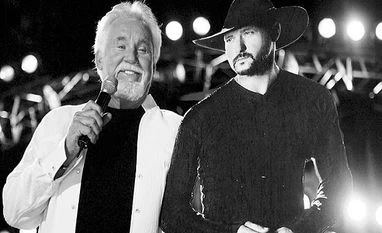Rogers had been in hospice care and died of natural causes, said his publicist, Keith Hagan.
Singing in a husky voice that exuded sincerity and warmth, Rogers sold well over 100 million records in a career that spanned seven decades. He had 21 No. 1 country hits, including two — “Lady,” written and produced by Lionel Richie, and “Islands in the Stream,” composed by the Bee Gees and performed with Dolly Parton — that reached No. 1 on the pop chart as well.
By the time he retired from performing for health reasons in 2018, Rogers had placed more than 50 singles in the country Top 40, of which 20 also appeared in the pop Top 40. Long before the ascendancy of Garth Brooks and Shania Twain in the 1990s, he was among the first country artists to sell out arenas.
Rogers’s popularity stemmed partly from his genial persona and rugged good looks, but also from his ability to inhabit his material, which, he often said, was of two main types: love songs like “You Decorated My Life” and narrative ballads like “The Gambler” and “Lucille.”
“All the songs I record fall into one of two categories, as a rule,” he said in a 2012 interview with NPR. “One is ballads that say what every man would like to say and every woman would like to hear. The other is story songs that have social significance.
“‘Reuben James’ was about a black man who raised a white child,” he continued, referring to a 1969 song that was a Top 40 hit for his group Kenny Rogers and the First Edition. “‘Coward of the County’ was about a rape. ‘Ruby, Don’t Take Your Love to Town’ was about a guy who came home from war.”
“Ruby” in particular revealed Rogers’s command as an interpreter of narrative ballads. Written by Mel Tillis, the song is about a veteran, left impotent and bound to a wheelchair by the Vietnam War, who must endure the agony of watching his wife leave the house every night to meet other men.
“And if I could move, I’d get my gun and put her in the ground,” Rogers broods as the record ends.
Duo recordings were a prominent part of Rogers’s repertoire, accounting for more than a dozen country hits, including eight No 1 records. Several of them, including “Don’t Fall in Love With a Dreamer,” a 1980 duet with the pop singer Kim Carnes, and “We’ve Got Tonight,” a remake of a Bob Seger hit performed with the Scottish singer Sheena Easton, were pop successes as well.
Rogers was particularly fond of singing the harmony part on vocal collaborations. In a 2013 episode of the television program “The Big Interview With Dan Rather,” he explained that harmonies had fascinated him ever since he first heard his older sister Geraldine singing them in church.
“I’d never heard harmony before, and I said, ‘What are you singing?’” he recalled. “She said, ‘Well, that’s called harmony, where you don’t sing the melody, but you sing something that sounds good with the melody.’ And I thought, ‘Oh, I’d like to do that.’” Rogers also recorded with R&B artists like James Ingram and Gladys Knight. Both the rapper Wyclef Jean and the neo-soul singer Anthony Hamilton have used passages from his music in their work.
Rogers came by his wide-ranging musical sensibilities naturally. After graduating from high school, he played upright bass in the Bobby Doyle Three, a well-regarded jazz trio. He became a member of the folk ensemble the New Christy Minstrels in the mid-’60s.
He later experimented with pop psychedelia on the First Edition’s 1967 single “Just Dropped In (To See What Condition My Condition Was In),” a Top 10 pop hit written by Mickey Newbury, with whom Rogers attended high school.
Most of Rogers’s material was written by others. Two notable exceptions were “Sweet Music Man,” a Top 10 country single in 1977 written solely by Rogers, and “Love or Something Like It,” a No. 1 country hit the next year, which he wrote with his longtime keyboardist, Steve Glassmeyer.
Rogers also had an acting career, starring in a series of TV movies based on his signature song, “The Gambler,” and in the 1982 feature film “Six Pack.”
He was also an avid photographer. He published two volumes of his work: “Kenny Rogers’ America” (1986), an assortment of photos of national landmarks and other places of interest, and “Your Friends and Mine” (1987), a collection of portraits of fellow celebrities like Elizabeth Taylor and Michael Jackson.
Rogers is survived by Wanda Miller, his wife of 22 years, and the couple’s twin sons, Justin and Jordan.
© 2020 The New York Times
To read the full story, Subscribe Now at just Rs 249 a month
Already a subscriber? Log in
Subscribe To BS Premium
₹249
Renews automatically
₹1699₹1999
Opt for auto renewal and save Rs. 300 Renews automatically
₹1999
What you get on BS Premium?
-
Unlock 30+ premium stories daily hand-picked by our editors, across devices on browser and app.
-
Pick your 5 favourite companies, get a daily email with all news updates on them.
Full access to our intuitive epaper - clip, save, share articles from any device; newspaper archives from 2006.
Preferential invites to Business Standard events.
Curated newsletters on markets, personal finance, policy & politics, start-ups, technology, and more.
Need More Information - write to us at assist@bsmail.in
)